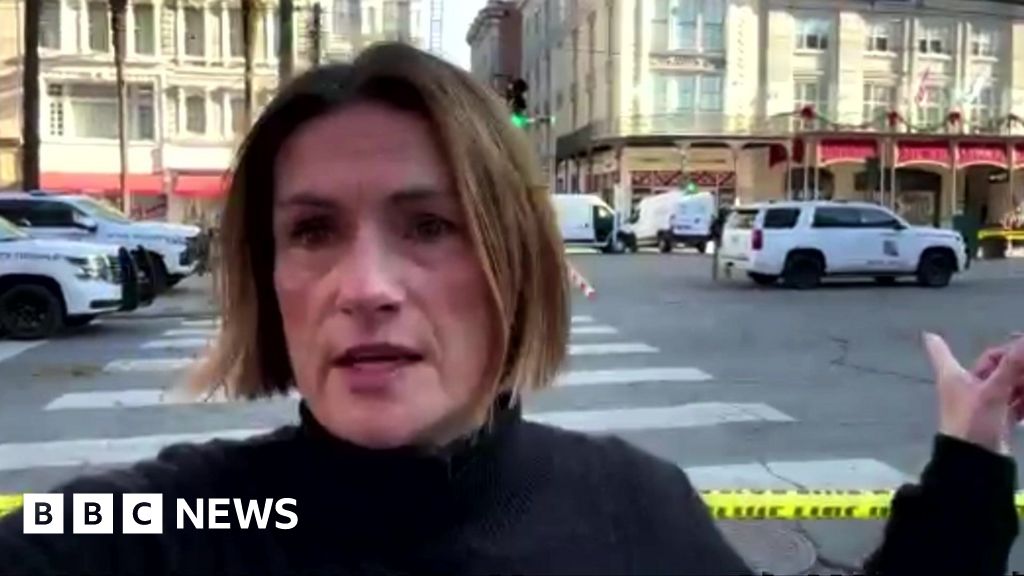 |
|
The tragic events of New Year's Eve in New Orleans unfolded with horrifying speed. A pick-up truck, driven by an as-yet-unidentified individual, deliberately plowed into a large crowd gathered to celebrate the new year, leaving a trail of devastation in its wake. The sheer scale of the incident is deeply shocking: ten people lost their lives, and at least 35 others sustained injuries, ranging from minor to critical. The scene, as described by BBC correspondent Anna Adams, who happened to be celebrating nearby just hours before the attack, was one of unimaginable chaos and grief. The sudden transition from festive celebration to horrific tragedy underscores the vulnerability of large public gatherings and the chilling ease with which such devastating acts can be perpetrated. The incident immediately raises questions regarding security protocols and the potential for similar attacks in the future. Investigations are underway to determine the precise motive behind the attack, and authorities are working tirelessly to identify and apprehend the perpetrator. The impact on the community is profound, reaching far beyond the immediate victims and their families. The collective trauma experienced by those who witnessed the event firsthand, as well as the broader sense of shock and fear rippling through the city, will undoubtedly have long-lasting consequences. The psychological toll on New Orleans, a city already burdened by various social and economic challenges, will be significant and will require comprehensive support systems to address.
The presence of BBC correspondent Anna Adams at the scene offers a powerful, firsthand account of the immediate aftermath. Her proximity to the incident underscores the unpredictable nature of such events, highlighting the fact that seemingly safe and festive environments can become targets of violence without warning. Her reporting provides crucial insight into the immediate response of emergency services, the sheer scale of the injuries sustained by victims, and the emotional turmoil experienced by those who were present. Her testimony will undoubtedly play a critical role in the ongoing investigations, providing a valuable human perspective alongside the forensic evidence and witness statements being collected by law enforcement. Moreover, her report serves as a stark reminder of the pervasive nature of violence in modern society and the need for continued vigilance and preparedness in the face of unpredictable threats. Her experience highlights the devastating human cost of such attacks, illustrating the profound impact on individuals, families, and communities.
In the wake of this tragedy, numerous questions remain unanswered. What were the motivations behind the attack? What security measures were in place, and were they adequate? What lessons can be learned to prevent similar incidents from occurring in the future? The investigation will need to thoroughly examine these issues, addressing not only the immediate circumstances of the attack but also the broader context of urban security and the challenges of safeguarding large public gatherings. This will involve not only law enforcement agencies but also urban planners, security experts, and mental health professionals, all working collaboratively to ensure a comprehensive response to both the immediate crisis and the long-term challenges it presents. The incident serves as a chilling reminder of the constant threat of violence and the importance of maintaining robust security measures in public spaces. The outpouring of grief and support from the broader community, both within New Orleans and internationally, testifies to the strength of human resilience in the face of tragedy. Healing will be a long process, demanding compassion, resources, and a commitment to ensuring that such an event never happens again.
The New Orleans attack serves as a stark reminder of the vulnerability of even the most festive and celebratory events to acts of violence. The seemingly random nature of the attack underscores the need for constant vigilance and the preparedness of emergency services. Beyond the immediate emergency response, the long-term consequences of the attack must be addressed through a multifaceted approach encompassing investigations, policy reforms, mental health support, and community rebuilding. While the immediate focus is on justice for the victims and support for those injured and bereaved, the longer-term challenges of healing and preventing future tragedies must also be given paramount importance. The ongoing investigation will shed light on the precise circumstances surrounding the attack, but the fundamental truth remains: acts of violence disrupt communities and inflict lasting emotional and physical scars. The strength and resilience of the New Orleans community will be tested in the coming weeks, months, and years. The support of the wider world will be critical as the city seeks to heal and to rebuild.
Source: Watch: BBC visits scene of deadly New Orleans attack
